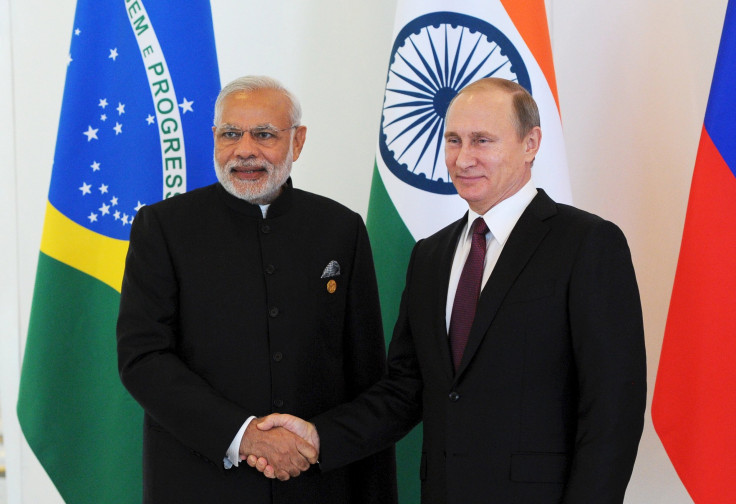Indian Prime Minister Narendra Modi To Visit Russia; Big Defense And Nuclear Deals Expected

Indian Prime Minister Narendra Modi is headed to Russia Wednesday on a two-day visit for an annual bilateral meeting between the countries. The meeting between Modi and Russian President Vladimir Putin is expected to focus on the areas of defense, nuclear energy, hydrocarbons, trade and counterterrorism.
India and Russia are likely to sign several agreements during the summit, chief among them being the acquisition of the S-400 air defense missile system by India. The deal was approved by the Indian defense ministry last week and by the Cabinet Committee on Security Tuesday. Modi, who is said to look upon both Russia and Putin as friends, will begin the trip with a private dinner hosted by Putin Wednesday evening in Moscow.
Am very optimistic about outcomes of my Russia visit. It will deepen economic & security ties with a valued friend. https://t.co/uZcZW4zvnA
— Narendra Modi (@narendramodi) December 23, 2015The price tag for the five S-400 systems is still being negotiated, but is likely to be about $4.5 billion, a defense ministry official told local newspaper Mint, making it the biggest defense deal between the two countries since 2001. In another significant deal for India, it will jointly manufacture 200 Kamov-226T helicopters with Russia. It is seen as a first big step for the Indian prime minister’s ‘Make in India’ push in the defense sector, according to media reports.
There is another $2.5 billion of military equipment that India wants to purchase, including three frigates, two diesel submarines, 48 military transport helicopters and about 150 armored vehicles, among others, reported Russia & India Report, a news site on bilateral relations.
The United States has displaced Russia as the top weapons supplier to India in recent years, but Russia continues to remain an important defense partner for the Asian country.
Nuclear energy is another area where big deals are expected. A Russia-designed nuclear power plant in Kudankulam, near the southern tip of the Indian subcontinent, is already operational, and the Indian media has widely reported that an agreement to add two more reactors to the facility will be signed during the summit.
Speaking to Russian news agency TASS on the eve of his departure to Moscow, Modi said: “We are finalizing a second site for Russian-designed reactors in India,” which is expected to be in the southeast coastal state of Andhra Pradesh.
India is also keen on deeper engagement with Russia’s hydrocarbons industry. After the U.S. and China, India is the world’s third largest oil importer, while Russia is the third largest oil producer globally, and also has huge reserves of natural gas. India is expected to push for greater involvement in exploration and production activities in Russia.
Space exploration and nanotechnology are other areas where the two countries can cooperate. Their current bilateral trade is about $10 billion and the countries are aiming to increase it to $30 billion over the next 10 years.
In their talks, the two leaders are expected to discuss global terrorism issues, with a specific focus on Syria. A discussion on Afghanistan may also take place, and Modi has unconfirmed plans to visit Kabul after Moscow.
The sixteenth annual bilateral summit between the leaders of both the countries has been held alternately in Moscow and New Delhi since 2000. At last year’s summit in New Delhi, the two countries signed 20 agreements in areas of oil and gas, defense, trade investments and others.
On Thursday, the two leaders will meet and interact with a group of Indian and Russian CEOs in the Kremlin. The Indian leader will address the Indian community in Russia later in the day before flying out of Moscow Thursday evening.
© Copyright IBTimes 2024. All rights reserved.











